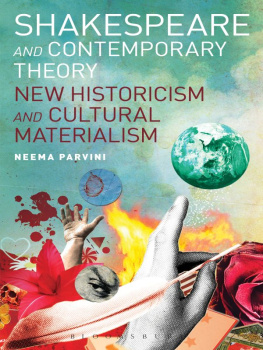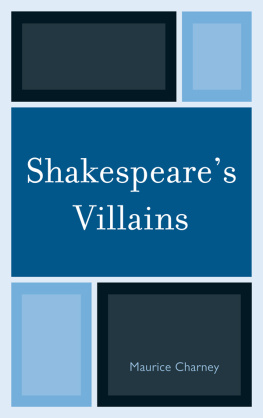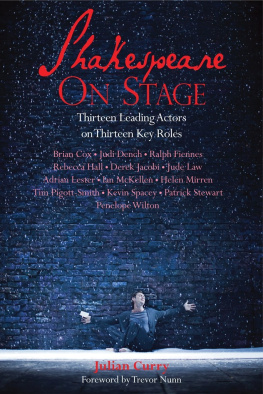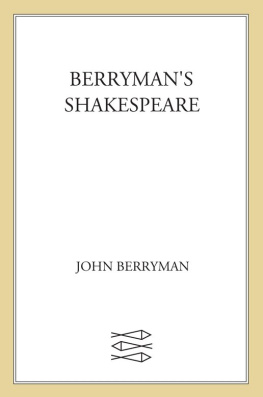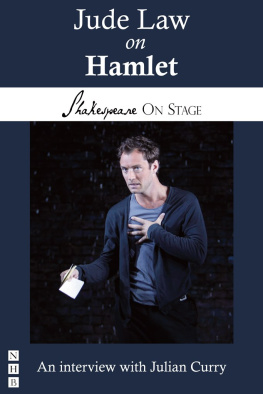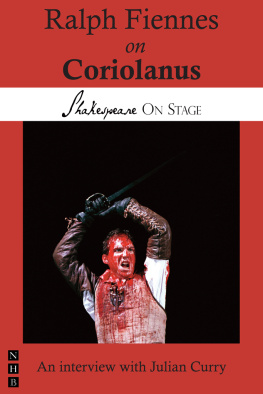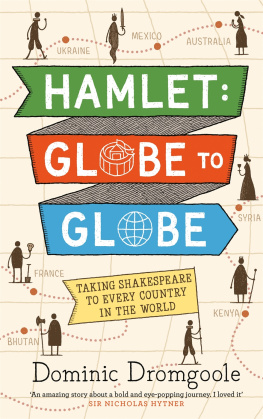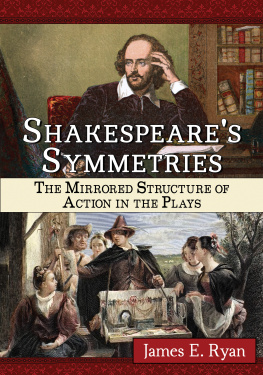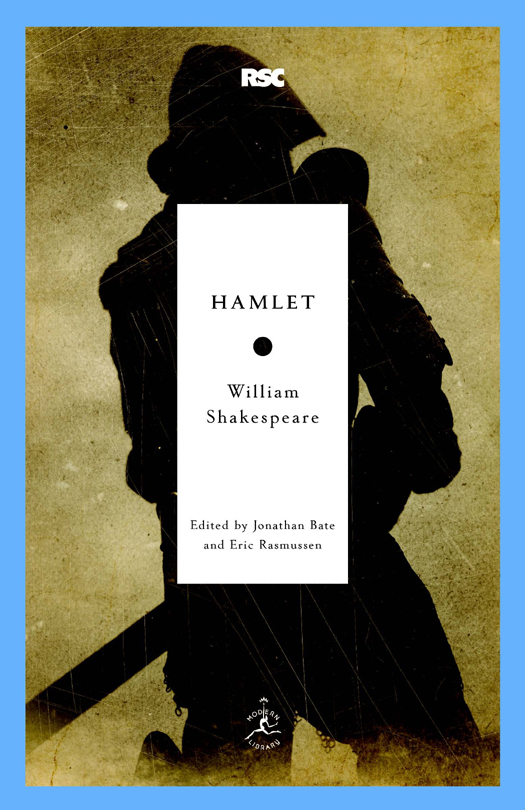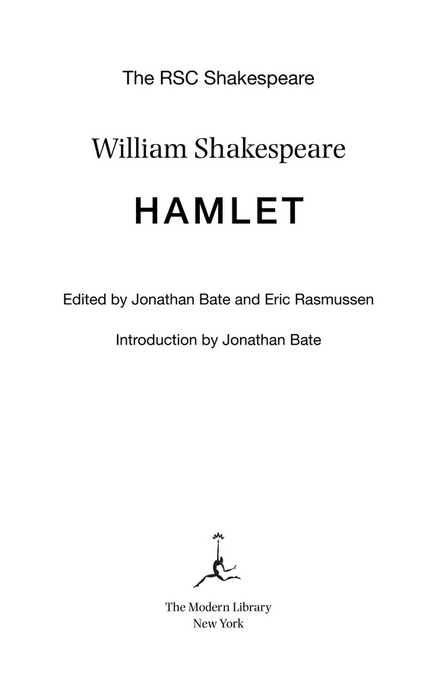The RSC Shakespeare Edited by Jonathan Bate and Eric Rasmussen
Chief Associate Editor: Hlose Snchal
Associate Editors: Trey Jansen, Eleanor Lowe, Lucy Munro, Dee Anna
Phares, Jan Sewell
Hamlet Textual editing: Eric Rasmussen
Introduction and Shakespeares Career in the Theater: Jonathan Bate
Commentary: Hlose Snchal
Scene-by-Scene Analysis: Esme Miskimmin
In Performance: Karin Brown (RSC stagings), Jan Sewell (overview),
Jonathan Bate (captions)
The Directors Cut (interviews by Jonathan Bate and Kevin Wright):
Michael Boyd, John Caird, Ron Daniels
Editorial Advisory Board Gregory Doran, Chief Associate Artistic Director,
Royal Shakespeare Company
Jim Davis, Professor of Theatre Studies, University of Warwick, UK
Charles Edelman, Senior Lecturer, Edith Cowan University,
Western Australia
Lukas Erne, Professor of Modern English Literature,
Universit de Genve, Switzerland
Maria Evans, Director of Education, Royal Shakespeare Company
Akiko Kusunoki, Tokyo Womans Christian University, Japan
Ron Rosenbaum, author and journalist, New York, USA
James Shapiro, Professor of English and Comparative Literature,
Columbia University, USA
Tiffany Stern, Fellow and Tutor in English, University of Oxford, UK
2008 Modern Library Paperback Edition Copyright 2008 by The Royal Shakespeare Company All rights reserved. Published in the United States by Modern Library, an imprint of
The Random House Publishing Group, a division of Random House, Inc., New York. M ODERN L IBRARY and the T ORCHBEARER Design are registered trademarks
of Random House, Inc. Royal Shakespeare Company, RSC, and the RSC logo are trademarks
or registered trademarks of The Royal Shakespeare Company. eISBN: 978-1-58836-826-3 www.modernlibrary.com v3.1
CONTENTS
INTRODUCTION
HAMLETS QUESTIONS
The mood of
Hamlet is set by its opening exchange: Whos there? Nay, answer me. The play creates the illusion of asking as many questions of its audience and interpreters as we may ask of it.
Shakespeare wont tell us who he is or where he stands. Instead, he makes usand our culturereveal ourselves. That is the source of his endurance and one of the reasons why Hamlet has long been regarded as his greatest, or at least his most characteristic, play. The Prince of Denmark himself is the most famously interrogative of all dramatic characters. He is Shakespeares ultimate man of words. The actor who plays him has to learn over 340 speeches; the role has a higher proportion of its plays words (nearly 40 percent) than any other in Shakespeare.
Hamlets favorite intellectual move is to make an action that he witnessesa player weeping, a skull tossed from an old graveinto the occasion for speculation: Whats Hecuba to him, or he to Hecuba, / That he should weep for her?, Where be your gibes now, your gambols, your songs, your flashes of merriment that were wont to set the table on a roar? In watching or reading the play, we are moved, like Hamlet, to ask the big questions: What should we believe? How should we act? What happens after death? In whose version of the truth should we have faith? Horatio, the commentator who comes closest to being the voice of the audience, says that he in part believes stories about ghosts and portents. His qualifier is a watchword for the whole play. Humankind is in part a godlike creature, full of mental and verbal powers, The beauty of the world, the paragon of animals. But, to take the other part, we are also quintessence of dustthe politician, the lawyer, the heroic man of action (Alexander the Great), and the humble clown (Yorick) all end up in the same place. Like the wood in A Midsummer Nights Dream, but with tragic as opposed to comic consequences, Elsinore is a place where everything seems double. Rosencrantz and Guildenstern are a double act engaged to spy on Hamlet, with the result that he has at each ear a hearer.
Hardly anyone in the play seems able to speak without producing a double epithet: the sensible and true avouch / Of mine own eyes, the gross and scope of my opinion, post-haste and rummage in the land, the grace and blush of modesty, and so on. Stage props also come in pairs: two contrasting portraits of two brothers, a pair of rapiers (one of which is sharpened and anointed for the kill), two skulls. Entrances seem to repeat themselves: the appearances of the Ghost; Hamlet overheard in meditation, first with a book, later with his reflections on being and not being; the king and Gertrude in their respective private rooms after the trauma of the Mousetrap play; Ophelias two mad scenes. The story of a son seeking vengeance for his fathers death is doubled after Hamlet kills Polonius: by the image of my cause I see / The portraiture of his, remarks Hamlet of Laertes. The motif is redoubled in the figure of Young Fortinbras out to avenge the defeat of Old Fortinbras. A further commentary is provided by the Players speech about Pyrrhus, son of Achilles, furiously seeking atonement for his fathers loss by slaughtering old King Priam.
But this might be construed as a negative example: Priam himself is an unnervd father and his slaughter moves a wife and mother, Hecuba, to distraction. If Hamlet were to become a killing machine like Pyrrhus, he would be diminishing himself to the inhumanity of his adversary, besides emotionally destroying his mother: that is his dilemma bounded in a nutshell. Hamlet is a student, a model for the perpetual students and idealists who populate later literature, especially in Germany and Russia. Like Shakespeares other highly intellectual drama, Troilus and Cressida, this is a play that debates the great questions of epistemology, ethics, and metaphysics. Humanism, the dominant educational theory of the sixteenth century, proposed that wisdom was to be derived from book learning. The student developed the arts of language through his rhetorical training, while collecting the wisdom of the ancients in the form of citations and sententiae copied into a commonplace book.
Polonius maxims on how Laertes should behave when away from home, climaxing in the clich to thine own self be true, are classic examples. The art of reason was refined through the study of common themes, one of which was death of fathers. Reason and judgment were supposed to prevail over will and passion. The Stoicism of Seneca provided a model for the use of philosophy as protection against the fickleness of fortune and the vicissitudes of court politics. Hamlets uncle must once have been a good student. He is a master of balanced rhetoric, the measure and decorum of his verse belying his crime against the order of nature and state: as twere with a defeated joy, With one auspicious and one dropping eye, With mirth in funeral and with dirge in marriage, In equal scale weighing delight and dole.
He thinks he knows, and that everyone in the court will accept, what is the appropriate length of time to mourn the death of a brother, husband, father. Hamlet despises such propriety. He is not interested in the common way of behaving. He speaks for the particular, the individual. Mourning duties, maintained for a set period, are to him mere outward show, the signs of a seeming with which he refuses to play along. He has that within which passeth show: the solitary self is set against social custom.



